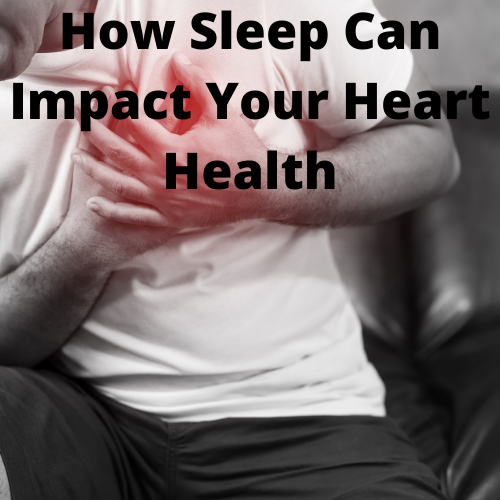
Sleep has tremendous effects on the body, including the heart. It's imperative to get the proper number of hours of sleep to provide the heart with extra protective factors against everything else that is a risk factor for developing cardiovascular disease (CVD). CVD is the number one killer in the United States, so if you can find ways to avoid it, that may be the thing to save your life! Continue reading to learn how sleep can impact your heart health and how to get the best sleep.
How much sleep is recommended?
The CDC recommends at least 7 hours of sleep a night for adults. However a majority of Americans don't get enough sleep. This may be okay in the short-term, but the in the long-term, it can be problematic. Sleep deprivation can be very detrimental for the body as it can induce health problems and worsen existing ones. These include hypertension, diabetes, obesity, and heart disease.
Health conditions linked to a lack of sleep
Adults who regularly get less than 7 hours of sleep a night are more likely to say that they've had health problems including a heart attack, asthma, and depression. Some of these health problems raise the risk for heart disease, heart attack and stroke.
High Blood Pressure
During normal sleep, blood pressure goes down. If you are having trouble sleeping, that means that your blood pressure stays higher for longer periods of time. High blood pressure, or hypertension, is the leading cause of or risk for heart disease and stroke. About 75 million Americans have hypertension.
Type 2 Diabetes
Diabetes is a disease that causes sugar to build up in your bloodstream because it cannot get into your muscles and other organs. This is dangerous for you because it messes with the osmolarity, or the water balance, in your body. It can also cause scarring of the kidney, among other issues. Studies show that getting enough good sleep may help to improve blood sugar control.
Obesity
A lack of sleep can lead to unhealthy weight gain. This is very true for children and teens who need more sleep than adults for proper development and hormone balance. Not getting enough sleep may also impact their brain development and the part that controls hunger.
Coronary Heart Disease
This is the leading cause of death in the United States. Coronary artery disease is the narrowing of arteries as a result of plaque build up, also known as a disease called arteriosclerosis. This narrows the arteries to the point where it is hard for oxygenated blood to get to the proper tissues, including the heart. This can lead to a heart attack or an ischemic event, two very dangerous conditions in which there is blockage of blood to vital organs.
Sleep deprivation can contribute to plaque build up, and therefore contribute to atherosclerosis. Plaque builds up as a consequence to inflammation involving white blood cells, and poor sleep can trigger chronic inflammation. This can elevate your risk for a heart attack and a stroke.
Fast heart rate and arrhythmias
In normal sleep, the heart rate drops during NREM sleep stage and then picks back up before you wake up. Poor sleep can generate a very quick uptick in your heart rate. Also, those with poor sleep are more likely to complain of irregular heartbeat. So, a lack of sleep may be tied to heart palpitations.
Also older adults who have frequent nightmares were considered more likely to report an irregular heartbeat, as well as a faster heart rate.
Conclusion: Get good sleep
Poor sleep can cause a variety of heart abnormalities and put you at higher risk for heart disease. This is why it's important to make sure that you are getting the proper sleep. You can do this a number of ways:
- Practice relaxation techniques before bed
- Establish a sleep routine that prepares your mind and body for bed
- Create a sleep environment that's exclusive to sleep and sex, and promotes quality rest
- Prioritize your sleep and go to bed and wake up at the same time everyday
If you are still having trouble sleeping after trying a variety of techniques, then you may have deeper issues that need to be worked out. Please click the orange button below in order to take a free online sleep test and speak with a professional.
Sources:
https://www.sleepfoundation.org/sleep-deprivation/how-sleep-deprivation-affects-your-heart
https://www.cdc.gov/bloodpressure/sleep.htm

